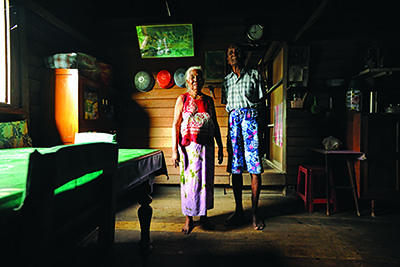YANGON — Charming and in radiant good health for an 87-year-old, David Daniels is testament to the benefits of discipline and prayer. A founding member of the Burma Star Association (soldiers who fought with the British during World War II), he is now one of the last remaining members of the British Burma forces.
The old soldier shares with his wife, Amy, a simple wooden bungalow in North Yangon decorated with British royal portraits, group photos of his ancestors and religious memorabilia. His secret for robust longevity? “No drink, no smoke, lots of tea. But there were lots of drinks during the army days.”
Born and brought up in Mandalay, Mr. Daniels joined the forces in December 1941, aged not yet 17, enlisting as a gunner in the Burma Auxiliary Force, part of the Royal British Legion in Burma, St George’s Hanover Branch. His father Reginald Daniels served in Palestine for the British Turks during WWI and was against his joining up. “But I was taken by the uniform and the marching and all. In the end he allowed me.”

Gunner David Daniels, serial number 3675, served in the 1st Coast Battery RA under Major W Jackson and in the Field Battery RA under Colonel Perrot. “During the war, I found that none could compete with the British, their discipline and their fighting. If they knew they would face certain sacrifice, they would retreat. They would not waste a life.”
The realities of war were a terrible experience. After 70 years, the nightmares are still with him.
“With the Japanese advancing, we retreated, crossed our bridge in Upper Burma and blew it up afterwards, destroying it on April 26, 1942. It was the last bridge before we went to India along with the Chinese troops. Half the people died on the way, of malaria and starvation,” he recalled. Mr. Daniels spent two months in hospital in Assam recovering from malaria and chronic dysentery.
Fierce fighting was experienced on the night of March 8, 1945, as the 4th Battalion of the Prince of Wales Gurkha Rifles climbed and finally captured Mandalay Hill. “A lot of Gurkhas were killed in the clearance between the pagodas. The chaps had no cover; they couldn’t reach safety. It was too high. I was below the hill firing 25-pounders. Captured men were tortured. It was better to be killed. Nowadays I wake shaking in the night. I have terrible dreams of people cutting off heads. I couldn’t find the remains. I was so frightened. I don’t mention all my suffering to my wife. But sometimes she hears me shouting in the night.” His wife’s familiar voice helps to soothe the devils in the dark.
For his service, Mr. Daniels was awarded the 1939-45 Medal, the Burma Star, the Defence Medal and the War Medal. On the Sunday closest to Nov. 11, Remembrance Day, he attends the Anglican Cathedral service, then goes to the Htauk Kyant War Cemetery north of Yangon to meet some war colleagues. The British Embassy sends a car at 6:15 am to take him to the remembrance service. Afterward he enjoys a drink and the ambassador’s buffet. “Good refreshments at the British embassy!”
A clean liver and practicing Christian, Mr. Daniels catches the bus to worship on alternate Sundays at St. John’s Armenian Church and the Anglican Holy Trinity Cathedral, which has a Forces Chapel dedicated to the men and women of many races and religions who fell while fighting with British and Allied Forces during the Burma Campaign, 1942-1945. Shields on the walls represent crests of the regiments and groups who served in this country.
“After the war, I worked for three years in charge of nighttime telephone calls and receiving telexes at the French embassy. Then I joined International Testing Services, a British company checking the quality of cooking oil and beans. I also did government service auditing military accounts from 1946-1986 before retiring. President U Thein Sein increased my pension from 800 kyat a month to 45,000 kyat.”
Proud of his service, Mr. Daniels has on his living room wall a handmade poster of his family tree covered with well-worn poppies. His maternal grandfather, a British soldier with the Daniels surname, fought in the Third Anglo-Burmese War (1885-86) under Maj-Gen Prendergast VC, when the British occupied Mandalay and sent King Thibaw and his wife Queen Supayalat into exile in India. “He married my grandmother Ma Ma Gyi who was a maid of honor attending the queen in the Mandalay Palace. Sometimes I can’t get over it. How did my grandfather and grandmother speak?” A dozen more family members are honored in this humble, important document.
“When the British embassy car drops me back home, the driver asks me, ‘Same time next year?’ I say, ‘If there is no final roll call for me, I’ll come.’”
This story first appeared in the December 2013 print issue of The Irrawaddy magazine.
















